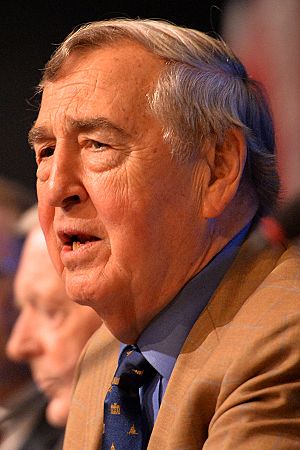Graham Allison facts for kids
Quick facts for kids
Graham Allison
|
|
|---|---|

Allison in 2017
|
|
| Director of the Belfer Center for Science and International Affairs | |
| In office June 1, 1995 – July 1, 2017 |
|
| Succeeded by | Ash Carter |
| Assistant Secretary of Defense for Policy and Plans | |
| In office August 6, 1993 – March 15, 1994 |
|
| President | Bill Clinton |
| Dean of the John F. Kennedy School of Government | |
| In office June 1, 1977 – May 30, 1989 |
|
| Preceded by | Don K. Price |
| Succeeded by | Robert D. Putnam |
| Personal details | |
| Born |
Graham Tillett Allison Jr.
March 23, 1940 Charlotte, North Carolina, U.S. |
| Children |
See list
|
| Education | Harvard University (BA, PhD) Hertford College, Oxford (BA, MA) |
Graham Tillett Allison Jr., born on March 23, 1940, is an American political scientist. He is a professor at the John F. Kennedy School of Government at Harvard University.
He is well-known for his ideas in the late 1960s and early 1970s. He studied how governments make important decisions, especially during big problems or crises. His book, Remaking Foreign Policy: The Organizational Connection, published in 1976, helped shape the foreign policy of the Carter administration.
Since the 1970s, Allison has also been a top expert on U.S. national security and defense. He has a special interest in nuclear weapons and how to prevent terrorism.
Contents
Early Life and School
Graham Allison grew up in Charlotte, North Carolina. He finished high school at Myers Park High School in 1958. He then went to Davidson College for two years.
After that, he moved to Harvard University and earned a bachelor's degree in 1962. He continued his studies at Oxford University in England as a Marshall Scholar. There, he earned two more degrees in philosophy, politics, and economics by 1964.
He returned to Harvard and completed his Ph.D. in political science in 1968. Famous diplomat Henry Kissinger was one of his teachers.
Career Highlights
Allison has spent his entire teaching career at Harvard. He became a full professor in 1972. This was partly because of his important book, Essence of Decision: Explaining the Cuban Missile Crisis, published in 1971.
Understanding Decisions
In his book, Allison looked at how decisions are made in foreign policy. He introduced new ways to think about it. Instead of just seeing leaders as "rational actors" (meaning they always make the best logical choice), he suggested other ideas.
He proposed an "organizational process model" and a "bureaucratic politics model." These models explain that decisions are often shaped by how government groups work and by the different interests of people within the government. His book changed how people studied decision-making in politics.
Leading at Harvard
From 1977 to 1989, Allison was the dean of the Harvard Kennedy School. During his time as dean, the school grew a lot. Its size increased by 400%, and its funding grew by 700%.
Government Service
From 1993 to 1994, Allison worked for the Assistant Secretary of Defense for Policy and Plans. In this role, he helped create strategies and policies for countries that used to be part of the Soviet Union.
President Bill Clinton gave Allison a special award, the Department of Defense Medal for Distinguished Public Service. He received it for helping to reduce the number of nuclear weapons in countries like Russia, Ukraine, Belarus, and Kazakhstan.
Allison also led the Belfer Center for Science and International Affairs from 1995 until 2017. Ash Carter, who later became the U.S. Secretary of Defense, took over from him.
The Thucydides Trap
In 2012, Graham Allison came up with the idea of the Thucydides Trap. He wrote about it in an article for the Financial Times. He used this idea to talk about the possibility of a war between the United States and China.
Allison describes the Trap as a historical pattern. It happens "when one great power threatens to displace another, war is almost always the result." In 2017, he wrote a whole book about this idea called Destined for War.
The theory is based on an ancient Greek historian named Thucydides. Thucydides wrote about the Peloponnesian War. He said that the war became unavoidable because of the growing power of Athens and the fear this caused in Sparta.
Allison believes this "trap" has appeared in other historical events. These include the start of World War I and the War of the Spanish Succession. The idea suggests that when a rising power challenges an existing one, conflict can be very likely.
Other Contributions
Graham Allison is still a professor at Harvard. He has also been involved with many important groups. He was a member of the Trilateral Commission and the Council on Foreign Relations.
In 1979, he received an honorary doctorate from Uppsala University in Sweden. In 2009, he won an award from the National Academy of Sciences. This award recognized his research on preventing nuclear war.
Defense Policy Work
Allison has been deeply involved in U.S. defense policy since the 1960s. He advised and consulted for the the Pentagon. He also worked as a consultant for the RAND Corporation.
He has been a member of the Secretary of Defense's Defense Policy Board since 1985. He was also a special advisor to Secretary of Defense Caspar Weinberger for three years during President Ronald Reagan's second term.
See also
 In Spanish: Graham Allison para niños
In Spanish: Graham Allison para niños
- Global policeman
- List of books about nuclear issues
- On Nuclear Terrorism
- The Four Faces of Nuclear Terrorism
- The Seventh Decade: The New Shape of Nuclear Danger

